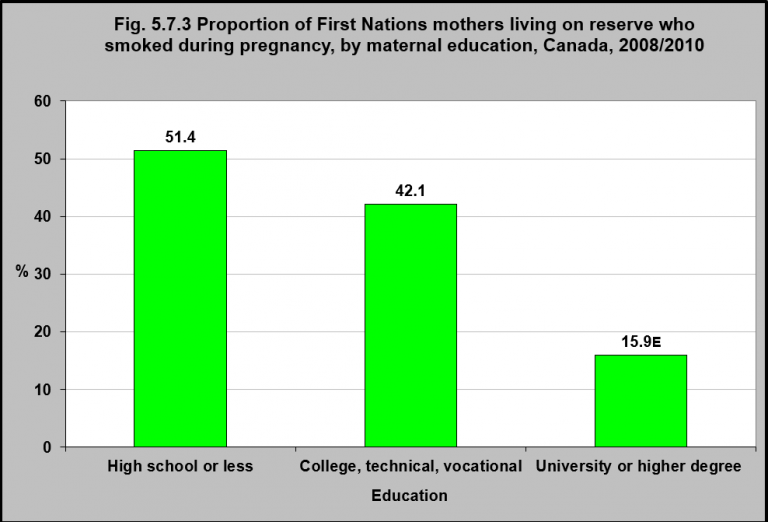Proportion of First Nations mothers living on reserve who smoked during pregnancy, by maternal education, Canada, 2008/2010

Note:
E = High sampling variability; interpret with caution.
Source: CICH graphic created using data adapted from the First Nations Regional Longitudinal Health Survey (RHS) 2008/10, National report on adults, youth and children living in First Nations Communities. https://fnigc.ca/sites/default/files/docs/first_nations_regional_health_survey_rhs_2008-10_-_national_report.pdf -accessed August 2.
In 2008/2010, First Nations women living on reserve with a high school education or less were more likely to smoke during pregnancy (51.4%) compared to First Nations women living on reserve who had a University or higher degree (15.9%).
Implications
Educational achievement has been found to be a predictor of smoking during pregnancy as well as quitting smoking during pregnancy.1 Higher levels of maternal education are associated with decreased likelihood of smoking during pregnancy and increased likelihood of being successful in quitting smoking upon pregnancy. Addressing the issue of maternal smoking among Indigenous women will require a holistic approach focused on increasing educational attainment of Indigenous women, together with targeted public health interventions that consider both the social reality and cultural context of Indigenous women’s lives.
1See for example Higgins, S.T., Heil, S.H., Badger, G.J., Skelly, J.M., Solomon, L.J., & Bernstein, I.M. (2009). Educational disadvantage and cigarette smoking during pregnancy. Drug & Alcohol Dependence, 104(Suppl 1), S100-S105; Severson, H.H., Andrews, J.A., Lichtenstein, E., Wall, M., & Zoref, L. (1995). Predictors of smoking during and after pregnancy: A survey of mothers of newborns. Preventive Medicine, 24(1), 23-28; and Walsh, R.A., Redman, S., Brinsmead, M.W., & Fryer, J.L. (2009). Predictors of smoking in pregnancy and attitudes and knowledge of risks of pregnant smokers. Drug and Alcohol Review, 16(1), 41-67.
